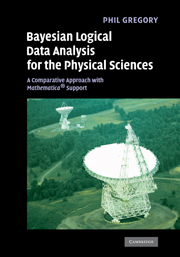 Bayesian Logical Data Analysis for the Physical Sciences
Bayesian Logical Data Analysis for the Physical Sciences Book contents
- Frontmatter
- Contents
- Preface
- Acknowledgements
- 1 Role of probability theory in science
- 2 Probability theory as extended logic
- 3 The how-to of Bayesian inference
- 4 Assigning probabilities
- 5 Frequentist statistical inference
- 6 What is a statistic?
- 7 Frequentist hypothesis testing
- 8 Maximum entropy probabilities
- 9 Bayesian inference with Gaussian errors
- 10 Linear model fitting (Gaussian errors)
- 11 Nonlinear model fitting
- 12 Markov chain Monte Carlo
- 13 Bayesian revolution in spectral analysis
- 14 Bayesian inference with Poisson sampling
- Appendix A Singular value decomposition
- Appendix B Discrete Fourier Transforms
- Appendix C Difference in two samples
- Appendix D Poisson ON/OFF details
- Appendix E Multivariate Gaussian from maximum entropy
- References
- Index
5 - Frequentist statistical inference
Published online by Cambridge University Press: 05 September 2012
- Frontmatter
- Contents
- Preface
- Acknowledgements
- 1 Role of probability theory in science
- 2 Probability theory as extended logic
- 3 The how-to of Bayesian inference
- 4 Assigning probabilities
- 5 Frequentist statistical inference
- 6 What is a statistic?
- 7 Frequentist hypothesis testing
- 8 Maximum entropy probabilities
- 9 Bayesian inference with Gaussian errors
- 10 Linear model fitting (Gaussian errors)
- 11 Nonlinear model fitting
- 12 Markov chain Monte Carlo
- 13 Bayesian revolution in spectral analysis
- 14 Bayesian inference with Poisson sampling
- Appendix A Singular value decomposition
- Appendix B Discrete Fourier Transforms
- Appendix C Difference in two samples
- Appendix D Poisson ON/OFF details
- Appendix E Multivariate Gaussian from maximum entropy
- References
- Index
Summary
Overview
We now begin three chapters which are primarily aimed at a discussion of the main concepts of frequentist statistical inference. This is currently the prevailing approach to much of scientific inference, so a student should understand the main ideas to appreciate current literature and understand the strengths and limitations of this approach.
In this chapter, we introduce the concept of a random variable and discuss some general properties of probability distributions before focusing on a selection of important sampling distributions and their relationships. We also introduce the very important Central Limit Theorem in Section 5.9 and examine this from a Bayesian viewpoint in Section 5.10. The chapter concludes with the topic of how to generate pseudo-random numbers of any desired distribution, which plays an important role in Monte Carlo simulations.
In Chapter 6, we address the question of what is a statistic and give some common important examples. We also consider the meaning of a frequentist confidence interval for expressing the uncertainty in parameter values. The reader should be aware that study of different statistics is a very big field which we only touch on in this book. Some other topics normally covered in a statistics course like the fitting of models to data are treated from a Bayesian viewpoint in later chapters.
Finally, Chapter 7 concludes our brief summary of frequentist statistical inference with the important topic of frequentist hypothesis testing and discusses an important limitation known as the optional stopping problem.
- Type
- Chapter
- Information
- Bayesian Logical Data Analysis for the Physical SciencesA Comparative Approach with Mathematica® Support, pp. 96 - 138Publisher: Cambridge University PressPrint publication year: 2005


